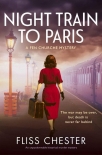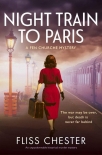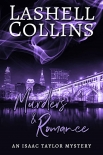Night Train to Paris Fliss Chester (e novels to read online .TXT) 📖

- Author: Fliss Chester
Book online «Night Train to Paris Fliss Chester (e novels to read online .TXT) 📖». Author Fliss Chester
‘Charming. Most of the cafés are open still and the Louvre is reopened now… and it even has some artwork in it.’ Rose took another deep drag from the elegant long black cigarette holder and laughed, waving at her own walls. ‘Not quite as much as I have, mind! I could come with you, though, I need to see Henri anyway.’
‘Who’s Henri?’ Fen quizzed her, while wracking her brains. She couldn’t remember an Henri from their shared past, but Rose had already mentioned him once today.
‘Henri Renaud,’ Rose replied and sat a little more upright. ‘I can’t remember what I told you when you stopped by last month, Fenella dear, but Henri and I worked together during the war.’
That made more sense. Fen knew that sometimes one’s wartime acquaintances were on a ‘need-to-know’ basis. Her talks with Arthur, and latterly James, had taught her that. Still, she was curious as to their relationship. ‘You worked together? At the école?’
‘No, not there. Henri has his own art gallery, you see, quite close to the Louvre, which is where he is also a consultant, if you will, a sort of roving fine art curator.’ She waved her cigarette in the air as she tried to find the words. ‘Put it this way, he is very well connected and the Louvre was very lucky to have him on board when it came to finding places to squirrel away their works before the Germans came.’
‘Was the Louvre raided by the Nazis?’ Fen asked and looked at Simone too for confirmation.
She stayed silent but raised her eyebrows.
‘Not raided so much, but leaned on rather heavily to send its masterpieces to the Fatherland for “safekeeping”. Ha! Safekeeping my derrière!’ Rose flicked ash across to the ashtray on the table and tutted to herself as she just missed. ‘Anyway, after all of that excitement, he was asked by the Germans to help with what they called the sequestration, or what we normal people would call the looting and pillaging.’ She paused for a moment, her brow furrowed. ‘The Germans wanted to steal as much art as they could from our galleries, both public and private, and from our homes.’
‘Not our homes as much,’ Simone added softly, following Rose’s eyeline up to the little Impressionist painting on the wall, the one between two of the grand windows that Fen had pointed out to James earlier.
‘Simone is right.’ Rose leaned forward and stubbed out the cigarette, replacing it in her hand with a glass of crème de menthe. ‘Those of us of a Christian persuasion got off lightly. But the Jews, oh dear Lord, what those poor people went through.’ Rose knocked back the green liqueur and winced slightly as she swallowed it down. ‘Those Nazi bastards would arrest the families on no charge save that of being Jewish, then commandeer the apartments and strip those homes of their valuables! Strings of pearls, diamonds, paintings, sculptures, furs! Everything was put in boxes and sent back to Germany for the pleasure of who knows who…’ Rose set down the thick glass tumbler rather heavily on the table and Fen noticed a shake to her hand as she poured herself another slug of the mint liqueur. ‘You want some?’ Rose asked and Simone, without being prompted, got up and went towards the kitchen. She returned a moment later with two more glass tumblers.
‘Just a little bit then,’ Fen murmured and accepted a shot of the crème de menthe. She was taking in what Rose had just told her, and it shocked her. She had known, of course, that the Nazis had routed out the Jews, and their treatment of that faith had been one of the reasons the Allies had joined the war, but now hearing more about death camps and sequestrations… it was becoming much clearer to her quite what terrible atrocities had been committed here in France.
‘So, what did you and Henri do together then, Rose?’ Fen was more curious than ever, a trait of her personality that at times landed her in the soup, but more often than not meant she got to the bottom of what she wanted to know. She posed her question and then leaned back again in her chair, tucking her stockinged feet up under her and, unlike Rose, nursed the eye-watering liquid, taking small sips as the older woman continued.
‘Henri Renaud is a well-connected man. And it is always who you know, not what you know, that gets you anywhere in this life. Not that Henri isn’t very clever, for a man, but he was definitely the right person in the right place, at the right time. He was married, you see, to a wonderful woman called Heidi, from Bavaria, but she died and the baby with her, oh, this must have been in ’35 or ’36. Anyway, Heidi had struck up a friendship with the wife of the German ambassador here in Paris and even after her death, Henri maintained a friendship with Otto and Susanne Abetz.’ Rose paused and picked something from her teeth, before changing tack slightly.
‘Now, don’t get me wrong, I’m as patriotic as the next eccentric artist, but I trod that fine line between collaborating and surviving.’ Rose looked at her and Fen wondered if she was trying to gauge Fen’s own reaction. She carried on a moment later. ‘You see, I didn’t refuse to paint the portraits of the German officers. Such vain men, the Germans, so interesting to paint.’ Rose lit another cigarette and inhaled deeply.
‘Wasn’t that frowned upon?’ Fen wouldn’t have dared asked anyone else, but there had been something about Rose’s telling of the story that invited it.
‘Frowned upon?’ Rose pulled a face. ‘Everyone should have access to art, dear girl, we are all equal in the muse’s eyes. And anyway,’ she raised just the one archly plucked eyebrow as she looked at Fen, ‘they paid handsomely and there’s nothing more insufferable than a starving artist.’ She winked. ‘And





Comments (0)